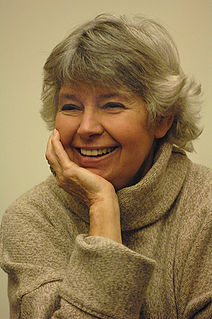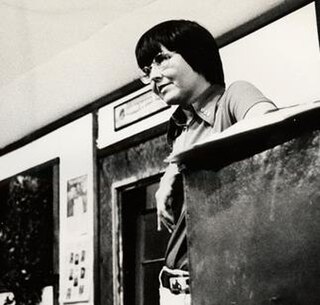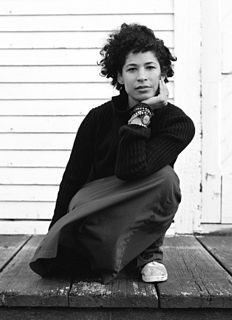Related Research Articles
Liberal feminism, also called mainstream feminism, is a main branch of feminism defined by its focus on achieving gender equality through political and legal reform within the framework of liberal democracy. As the oldest of the "Big Three" schools of feminist thought, liberal feminism has its roots in 19th century first-wave feminism that focused particularly on women's suffrage and access to education, and that was associated with 19th century liberalism and progressivism. Liberal feminism "works within the structure of mainstream society to integrate women into that structure." Liberal feminism places great emphasis on the public world, especially laws, political institutions, education and working life, and considers the denial of equal legal and political rights as the main obstacle to equality. Liberal feminism is inclusive and socially progressive, while broadly supporting existing institutions of power in liberal democratic societies, and is associated with centrism. Liberal feminism actively supports men's involvement in feminism and both women and men have always been active participants in the movement; progressive men had an important role alongside women in the struggle for equal political rights from the 19th century.

Robin Morgan is an American poet, author, political theorist and activist, journalist, lecturer, and former child actor. Since the early 1960s, she has been a key radical feminist member of the American Women's Movement, and a leader in the international feminist movement. Her 1970 anthology Sisterhood is Powerful has been widely credited with helping to start the contemporary feminist movement in the US, and was cited by the New York Public Library as "One of the 100 Most Influential Books of the 20th Century." She has written more than 20 books of poetry, fiction, and nonfiction, and is also known as the editor of Ms. magazine.

Mary Daly was an American radical feminist philosopher, academic, and theologian. Daly, who described herself as a "radical lesbian feminist", taught at the Jesuit-run Boston College for 33 years. Daly retired in 1999, after violating university policy by refusing to allow male students in her advanced women's studies classes. She allowed male students in her introductory class and privately tutored those who wanted to take advanced classes.

Third-wave feminism is an iteration of the feminist movement. It began in the United States in the early 1990s and continued until the rise of the fourth wave in the 2010s. Born in the 1960s and 1970s as members of Generation X and grounded in the civil-rights advances of the second wave, third-wave feminists embraced individualism in women and diversity and sought to redefine what it meant to be a feminist. The third wave saw the emergence of new feminist currents and theories, such as intersectionality, sex positivity, vegetarian ecofeminism, transfeminism, and postmodern feminism. According to feminist scholar Elizabeth Evans, the "confusion surrounding what constitutes third-wave feminism is in some respects its defining feature."
The term postfeminism is used to describe reactions against contradictions and absences in feminism, especially second-wave feminism and third-wave feminism. The term postfeminism is sometimes confused with subsequent feminisms such as fourth-wave feminism and xenofeminism.

Eleanor Smeal is one of the major leaders of the modern-day American feminist movement. Smeal is the president and a cofounder of the Feminist Majority Foundation and has served as president of the National Organization for Women for three terms, in addition to her work as an activist, grassroots organizer, lobbyist, and political analyst.
A combination of Islam and feminism has been advocated as "a feminist discourse and practice articulated within an Islamic paradigm" by Margot Badran in 2002. Islamic feminists ground their arguments in Islam and its teachings, seek the full equality of women and men in the personal and public sphere, and can include non-Muslims in the discourse and debate. Islamic feminism is defined by Islamic scholars as being more radical than secular feminism and as being anchored within the discourse of Islam with the Quran as its central text. As a "school of thought", it is said to refer to Moroccan sociologist "Fatema Mernissi and scholars such as Amina Wadud and Leila Ahmed".

The National Organization for Women (NOW) is an American feminist organization founded in 1966. The organization consists of 550 chapters in all 50 U.S. states and in Washington, D.C.

Kimberlé Williams Crenshaw is an American lawyer, civil rights advocate, philosopher, and a leading scholar of critical race theory. She is a full-time professor at the UCLA School of Law and Columbia Law School, where she specializes in race and gender issues. Crenshaw is also the founder of Columbia Law School's Center for Intersectionality and Social Policy Studies (CISPS) and the African American Policy Forum (AAPF), as well as the president of the Berlin-based Center for Intersectional Justice (CIJ).
Amelia "Amy" Richards is an American activist, organizer, writer, television producer, feminist, and art historian, currently residing in New York. She graduated from Barnard College in 1992. Richards has appeared on Fox’s The O'Reilly Factor, Oprah, Talk of the Nation, New York One and CNN. She produced the Emmy-nominated series Woman, which airs on Viceland. She is the president of Soapbox, Inc., a feminist lecture agency.
Equity feminism is a form of liberal feminism that advocates the state's equal treatment of women and men without challenging inequalities perpetuated by employers, educational and religious institutions, and other elements of society. The concept has been discussed since the 1980s. Equity feminism has been defined and classified as a kind of classically liberal or libertarian feminism, in contrast with social feminism, difference feminism, gender feminism, and equality feminism.

Miss Representation is a 2011 American documentary film written, directed, and produced by Jennifer Siebel Newsom. The film explores how mainstream media contributes to the under-representation of women in influential positions by circulating limited and often disparaging portrayals of women. The film premiered in the documentary category at the 2011 Sundance Film Festival.

The Bechdel test, also known as the Bechdel–Wallace test, is a measure of the representation of women in fiction. It asks whether a work features at least two women who talk to each other about something other than a man. The requirement that the two women must be named is sometimes added.
Sikhism was founded in Punjab in 1469 by Guru Nanak on the foundations that everyone is equal, regardless of caste, age, or gender. Both men and women are supposed to follow the Five Ks: Kesh, Kangha (comb), Kara, Kachera and Kirpan, and there was never a distinction between what a woman should be allowed to do versus a man. Men and women are treated equally in the temple (gurdwara), and everyone eats and prays side-by-side. Both men and women are meant to carry the Kirpan with them as they are responsible for their own physical protection, and should not depend on others. Sikhs are strictly against the caste system and many chose to use Kaur or Singh as a last name to push against the problematic caste system in India. There is only one god (Waheguru) in Sikhism and they are without form or gender, and everyone is equal in the eyes of God. Many Sikh women believe that this absence of assignment of code of conduct for a woman versus a man proves that their religion is historically committed to gender equality. Presently, the culture does not always follow these traditions and equality is often more true in ideals rather than daily practice. In North America the Five Ks are mostly just followed by men; however, many religiously devoted women also choose to commit to Sikh rehni, the Sikh way of life. Many Sikh women also choose to wear a turban as a socio-political move to fight inequality in the religion and show their Sikh essentialism. There are also groups which have been formed by Sikhs, like SAFAR, which are committed to uncovering and challenging oppression within the Sikh community, as well as re-establishing equity in the Sikh culture.

Eli Erlick is an American activist, writer, and director of the organization Trans Student Educational Resources.

The Women's Equality Party is a feminist political party set up in the United Kingdom in 2015. The idea was conceived by Catherine Mayer and Sandi Toksvig at the Women of the World Festival, when they concluded that there was a need for a party to campaign for gender equality to the benefit of all. The launch meeting was on 28 March 2015 under the title "The Women's Equality Party needs you. But probably not as much as you need the Women's Equality Party". The party's full policy was launched by its then-leader Sophie Walker at Conway Hall on 20 October 2015. In January 2020, Mandu Reid took over as party leader.
Fourth-wave feminism is a feminist movement that began around 2012 and is characterized by a focus on the empowerment of women, the use of internet tools, and intersectionality. The fourth wave seeks greater gender equality by focusing on gendered norms and marginalization of women in society.
Mandu Reid is the leader of the British Women's Equality Party (WEP).
Saira Sameera Rao is a far-left American political activist, author, publisher, and former Wall Street lawyer and television producer. She is the co-founder of Race2Dinner, In This Together Media, and Haven, and came to greater prominence in 2018 when she ran for Congress, losing out to incumbent Democrat Diana DeGette in the primary.
References
- ↑ "Marianne Schnall, Author, Activist and Speaker". marianneschnall.com. Retrieved 2017-07-13.
- ↑ "What is Feminist.com?". Feminist.com. Retrieved 2021-04-29.
- 1 2 "Feminist.com:::Resources". Feminist.com. Retrieved 2021-04-29.
- ↑ "Welcome Letter". What Will It Take. Retrieved 2021-04-29.
- ↑ "About". What Will It Take. Retrieved 2021-04-29.
- ↑ "Initiatives Archives". What Will It Take. Retrieved 2021-04-29.
- ↑ "Workplace Equity Initiative". What Will It Take. 2018-11-16. Retrieved 2021-04-29.
- ↑ "Women & Money Initiative". What Will It Take. Retrieved 2021-04-29.
- ↑ "Women & Politics". What Will It Take. 2018-09-27. Retrieved 2021-04-29.
- ↑ "Women & Media". What Will It Take. 2018-08-15. Retrieved 2021-04-29.
- ↑ "Women & Sports". What Will It Take. 2018-08-14. Retrieved 2021-04-29.
- ↑ https://huffingtonpost.com/marianne-schnall
- ↑ "Meet Marianne Schnall".
- ↑ Feminist Task Force (2017-01-13). "2014 Amelia Bloomer List". American Library Association. Retrieved 2021-04-29.
- ↑ Schnall, Marianne (2017-12-15). "2018 will be the year of women". CNN. Retrieved 2021-04-29.
- ↑ Schnall, Marianne (2017-08-26). "10 Quotes To Inspire You This Women's Equality Day". HuffPost. Retrieved 2021-04-29.
- ↑ Schnall, Marianne (2017-12-05). "Exclusive Insights From Four TEDWomen Speakers". HuffPost. Retrieved 2021-04-29.
- ↑ Schnall, Marianne (2017-11-13). "From #MeToo to Men Too: How Men Can Prevent Harassment and Abuse". HuffPost. Retrieved 2021-04-29.
- ↑ Schnall, Marianne (2017-07-24). "Moby, Russell Simmons And Others Speak Out On An Issue That Needs Our Immediate Attention". HuffPost. Retrieved 2021-04-29.